Grand Slam of Thoroughbred racing
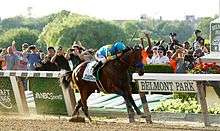
The Grand Slam of Thoroughbred racing is an informal name for the Triple Crown and the Breeders' Cup Classic, the four most prominent races in American horse racing.[1] The only horse to date to have won all four is American Pharoah, in 2015.[2]
Background
The Kentucky Derby, Preakness Stakes and Belmont Stakes constitute the American Triple Crown of horse racing, and since 1919, only 13 horses have won that award. The Breeders' Cup series of year-end championship races began in 1984, which was well after the racing career of Affirmed, who in 1978 had been the 11th horse to win the Triple Crown.[2] The Breeders' Cup traditionally has the highest purse of any race in the U.S. and one of the highest purses of any race in the world. It differs from the Triple Crown, other than in its relative newness, in that it is not held at the same location each year.
The term "Grand Slam" to describe the four-race sequence was used on June 7, 2015, by Bob Ehalt of ESPN, announcing, "The Grand Slam era has officially begun," following American Pharoah's win in the 2015 Belmont Stakes, when owner Ahmed Zayat committed the colt to racing for the remainder of the 2015 season rather than immediately retiring the horse to stud.[3] Other sports writers quickly picked up the concept and made the term a part of the horse racing lexicon.[4]
Justify, the winner of the 2018 Triple Crown, was slated to contest for the Grand Slam and compete for the 2018 Breeders Cup Classic. In July of that year, the horse sustained a leg injury; his handlers, who were not certain the horse would recover in time and were unwilling to race the horse as a four-year-old, ended plans to race in the Cup and retired the horse to stud.[5]
The Breeders' Cup Classic is, in contrast to the races in the Triple Crown, not restricted to any age group and has traditionally been contested by three-year and four-year-old horses. The preliminary use of the term has suggested that a horse would have to win all four races in the same year to claim a Grand Slam title.[1] To do so means that after the Triple Crown, the horse would have to compete against, and defeat, older, more physically developed and more experienced horses to win the Breeders' Cup Classic.[3]
| Race | Date | Current Track | Location | Distance | Background | Trophy |
|---|---|---|---|---|---|---|
| Kentucky Derby "The Run for the Roses" |
First Saturday in May | Churchill Downs | Louisville, Kentucky | 1 1⁄4 miles (2,000 m) | Inaugurated in 1875, the race was originally 1 1⁄2 miles (2,400 m) until 1896 when it was shortened to its current distance. It is the only one of the four races to have been continuously run from its inception. Colts and geldings carry 126 pounds (57 kg) and fillies 121 pounds (55 kg). The field has been limited to 20 horses since 1975. |  The Kentucky Derby Trophy |
| Preakness Stakes "The Run for the Black-Eyed Susans" |
Third Saturday in May | Pimlico Race Course | Baltimore, Maryland | 1 3⁄16 miles (1,900 m) | Started in 1873 and continuously run since 1894, it is the shortest of the four races. Pimlico was the home of the race from 1873 to 1889 and again from 1908 until the present. The Preakness was not run from 1891 to 1893. Weights are the same as for the Derby. Field is limited to 14 horses. | 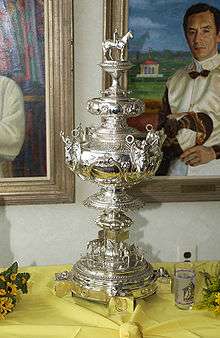 The Woodlawn Vase |
| Belmont Stakes "The Test of the Champion" |
Third Saturday following the Preakness (first or second Saturday in June) |
Belmont Park | Elmont, New York | 1 1⁄2 miles (2,400 m) | Begun in 1867, it is the oldest of the four races and the longest, though not held in 1911 and 1912 due to anti-gambling legislation in New York. Race was held at various New York tracks until 1905 when Belmont Park became the permanent location. Distance varied from 1 5⁄8 to 1 1⁄8 miles until set at 1 1⁄2 miles in 1926. Weight assignments are the same as the other two races. Field is limited to 16 horses. | 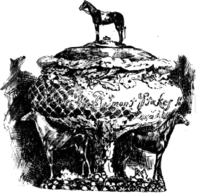 The August Belmont Trophy |
| Breeders' Cup Classic | Last Saturday in October or the first Saturday in November | Different location each year | Different location each year | 1 1⁄4 miles (2,000 m) | Started in 1984, it is the newest of the four races and is the same length as the Kentucky Derby. The race is held at various different tracks, Santa Anita Park in Arcadia, California has hosted the most with nine. The Breeders' Cup Classic differs from the other races in the Grand Slam, as it allows 3 year olds and up to participate. The field is limited to 14 horses. |  The Breeders' Cup Trophy |
Triple Crown series and Breeders Cup Classic winners

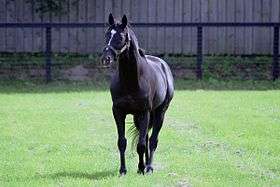
| Year | Winner | Jockey | Trainer | Owner | Breeder | Colors |
|---|---|---|---|---|---|---|
| 2015 | American Pharoah | Victor Espinoza | Bob Baffert | Ahmed Zayat | Ahmed Zayat | 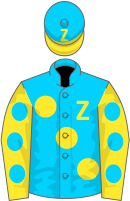 |
An ongoing challenge for young horses who win races in the Triple Crown series is remaining sound and healthy for future races. In the case of their owners, it can also be difficult to resist the temptation to protect a valuable horse from future risk of injury and retire them early to stud following a major win.[3]
Since the Breeders' Cup Classic was first run in 1984, 12 winners were three-year-olds,[6] but only nine had contested any of the Triple Crown races in the same year, and only five had won one or more of the earlier races. Overall, fewer than half of the Breeders' Cup Classic winners of any age had entered any of the Triple Crown races when they were three-year-olds. Only eight Classic winners, including American Pharoah, had also won at least one of the Triple Crown series races. Some did not win in the same three-year-old season, but did so as older horses.[6]
The first horse to contest the Triple Crown series and then win the Classic, as well as the first horse to win the Classic as a three-year-old was Proud Truth, who had finished fifth in the 1985 Kentucky Derby and won the Classic the same year.[7] The first horse to win both a Triple Crown series race and the Classic was Ferdinand, who won the 1986 Kentucky Derby as a three-year-old and then the 1987 Classic as a four-year-old.[8] Of the five horses to win at least one Triple Crown race and the Classic in the same three-year-old season, the first was Sunday Silence, who won the Derby and the Preakness, and was second in the Belmont. He was the horse who came the closest to winning the Grand Slam prior to American Pharoah's success.[9] The only other horse to win three of the four Grand Slam races was Alysheba, but that horse won the Classic as a four-year-old.[10] Three other horses won a Triple Crown series race and then the Classic in their three-year-old season: Unbridled, A. P. Indy, and Curlin. Unbridled and Curlin contested the Classic again as four-year-olds, but did not win.[11][12][13]
Triple Crown series race winners who also won the Breeders' Cup Classic in the same year were:
- 1989: Sunday Silence, winner of the 1989 Kentucky Derby and 1989 Preakness Stakes, second in the 1989 Belmont Stakes; the first winner of both a Triple Crown race and the Classic as a three-year-old.[9]
- 1990: Unbridled, winner of the 1990 Kentucky Derby, winner of the Classic as a three-year-old, also third in the 1991 Classic as a four-year-old.[11] Unbridled was also the great-grandsire of American Pharoah.[14]
- 1992: A. P. Indy, winner of the 1992 Belmont Stakes, winner of the Classic as a three-year-old.[12]
- 2007: Curlin, winner of the 2007 Preakness Stakes, winner of the Classic as a three-year-old, also fourth in the 2008 Classic as a four-year-old.[13]
- 2015: American Pharoah, first winner of the Grand Slam.[15]
Triple Crown series race winners who won the Breeders' Cup Classic in a later year were:
- 1987: Ferdinand, winner of the 1986 Kentucky Derby, winner of the Classic as a four-year-old.[8]
- 1988: Alysheba, winner of the 1987 Kentucky Derby and 1987 Preakness Stakes, second to Ferdinand in the Classic as a three-year-old, winner of the Classic as a four-year-old.[10]
- 2011: Drosselmeyer, winner of the 2010 Belmont Stakes, winner of the Classic as a four-year-old.[16]
- Three-year-old winners Unbridled and Curlin each returned to defend their Breeders' Cup Classic titles the following year, but without winning.
Other winners of the Breeders' Cup Classic who had entered, but not won, a Triple Crown series race included:
- Skywalker, sixth in the 1985 Derby before winning the 1986 Classic as a four-year-old.
- Concern three-year-old Classic winner in 1994, third in that same year's Preakness.[6]
- Skip Away 1997 Classic winner, contested all three Triple Crown races the year prior, finishing twelfth in the 1996 Derby, then second in both the Preakness and the Belmont.[17]
- Cat Thief, a three-year-old winner of the 1999 Classic, was third in the 1999 Kentucky Derby and seventh in the Preakness.
- Mucho Macho Man, five-year-old winner of the Classic in 2013, had contested all three legs of the Triple Crown in 2011, finishing third in the Derby, sixth in the Preakness and seventh in the Belmont.
- Bayern three-year-old winner of the 2014 Classic finished second-to-last in the Preakness.
An interesting "Triple Crown" winner was Invasor, who won the 2006 Classic, and had been the 2005 winner of Uruguay's Triple Crown. Invasor won his Triple Crown by November 2005 and won the Classic in the ensuing year (the Uruguay version races through the time period that the Classic is raced, so he swept the three races in 2005 and then finished it off in his first Classic opportunity at four years of age).[18] Other horses who won major races in other nations prior to a Breeders' Cup Classic win included 1998 winner Awesome Again, who had won the 1997 Queen's Plate, a Canadian Classic race.[6]
Individual race winners
| Denotes winners of the Grand Slam | |
| * | Denotes other winners of the Triple Crown but not the Breeders' Cup Classic |
| # | Denotes other winners of any other combination of 3 out of the 4 Grand Slam races |
[Fy] denotes a filly.
See also
References
- 1 2 Knight, Matthew (January 20, 2016). "From Triple Crown 'sweetheart' to $200K stud". CNN. Retrieved September 28, 2017.
- 1 2 Bieler, Des (October 31, 2015). "Watch American Pharoah win horse racing's first-ever Grand Slam at Breeders' Cup". The Washington Post. Retrieved October 31, 2015.
- 1 2 3 Ehalt, Bob (June 7, 2015). "A new target for American Pharoah". ESPN. Retrieved September 28, 2017.
- ↑ Lintner, Jonathan (June 9, 2015). "Odds open for Pharoah's 'Grand Slam' attempt". The Courier-Journal. Retrieved 28 September 2017.
- ↑ "Triple Crown Winner Justify Retires from Racing". ESPN.com. Retrieved 26 July 2018.
- 1 2 3 4 "Breeders' Cup Stats". stats.breederscup.com. Retrieved 29 September 2017.
- ↑ "Proud Truth". Equibase. Retrieved 2 October 2017.
- 1 2 "Ferdinand". Equibase. Retrieved 28 September 2017.
- 1 2 "Sunday Silence". Equibase. Retrieved 28 September 2017.
- 1 2 "Alysheba". Equibase. Retrieved 28 September 2017.
- 1 2 "Unbridled". Equibase. Retrieved 28 September 2017.
- 1 2 "A.P. Indy". Equibase. Retrieved 28 September 2017.
- 1 2 "Curlin". Equibase. Retrieved 28 September 2017.
- ↑ "American Pharoah pedigree". Equineline. Retrieved July 14, 2015.
- ↑ "American Pharoah". Equibase. Retrieved 28 September 2017.
- ↑ "Drosselmeyer". Equibase. Retrieved 28 September 2017.
- ↑ "Skip Away". Equibase. Retrieved 28 September 2017.
- ↑ "Connections Salute Invincible Invasor". Sporting Life. July 24, 2006. Retrieved June 20, 2012.